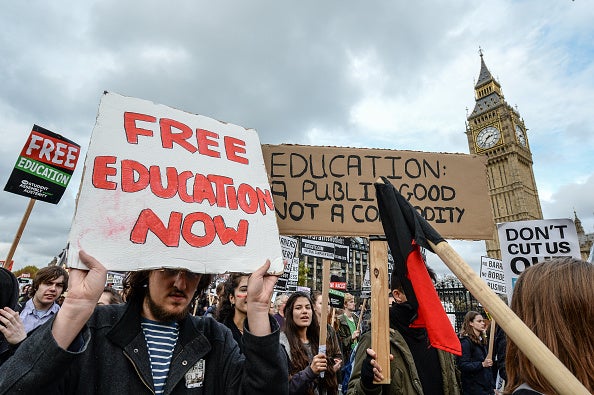Conservatives’ ‘repeated attacks’ on higher education see ‘hugely concerning’ decline in student numbers
Government needs to 'realise the damage its policies are causing' and must take action to 'reverse this dramatic decline', says NUS VP of higher education

Your support helps us to tell the story
From reproductive rights to climate change to Big Tech, The Independent is on the ground when the story is developing. Whether it's investigating the financials of Elon Musk's pro-Trump PAC or producing our latest documentary, 'The A Word', which shines a light on the American women fighting for reproductive rights, we know how important it is to parse out the facts from the messaging.
At such a critical moment in US history, we need reporters on the ground. Your donation allows us to keep sending journalists to speak to both sides of the story.
The Independent is trusted by Americans across the entire political spectrum. And unlike many other quality news outlets, we choose not to lock Americans out of our reporting and analysis with paywalls. We believe quality journalism should be available to everyone, paid for by those who can afford it.
Your support makes all the difference.The Government’s repeated attacks on higher education have resulted in a “dramatic fall” in students numbers, the National Union of Students (NUS) has said.
According to the student campaigner, figures* in England have shown the number of those heading to university have plummeted from six million in the 2012/13 academic year, to 5.2 million in 2014/15.
Describing the statistics as “hugely concerning,” the NUS said the decline has come about because tuition fees have tripled, the student loan repayment threshold has been changed retrospectively, and the disabled students’ allowance has been slashed.
Part-time, mature, postgraduate, and international students have been among the hardest hit by the Conservatives’ “regressive policies.” NUS calculations have shown the number of part-time students in higher education has dropped by 38 per cent over the last five years and, since 2010, the number of adult learners in further education has also dropped by 1.3 million.
Student numbers are now only likely to fall even further, said the student campaigner, following the cut of maintenance grants and proposed cuts to NHS bursaries also.
NUS vice president of higher education, Sorana Vieru, said, every time the Government launches a new attack on students, they “tout out that the numbers haven’t been affected or have increased.”
This, she said, is “blatantly untrue,” adding: “The Government needs to realise the damage its policies are causing. Politicians’ commitment to social mobility and widening participation is only at surface level - they don’t realise part-time education is essential to this agenda.”
Ms Vieru said the NUS is now calling on the Government to take action to “reverse this dramatic decline.” She added: “Our research highlights that a main deterrent for students is the cost of education and the size of the debt they’d incur.
“To get student numbers back to healthy levels, we need to sort out the funding system and stop plunging students further and further into debt.”
The NUS’s call has come just a day before Times Higher Education’s (THE) European University Rankings have shown that, despite the UK coming out on top as having the most top institutions on the continent, other countries - particularly Germany - are beginning to catch up as students opt to study elsewhere.
Editor of the rankings, Phil Baty, said: “Not only are our restrictive immigration policies and noisy rhetoric leading many students to perceive they are not welcome in the UK, we are also seeing the increasing popularity of European universities which are often just as highly ranked as their UK competitors but also much, much cheaper to study with.
“These powerful universities on the continent are actively challenging UK market share: delivering more and more degree courses fully in English to attract students who, in the past, would only have chosen the UK, US, or Australia.
Emphasising the “huge importance” of international students to the health of the UK higher education system, and the wider economy, Mr Baty added: “They spend about £4.5 billion on tuition fees and accommodation alone, but they also add much to the overall student experience by supporting a rich, multicultural campus life for all students.
“But this vital lifeline is increasingly at risk - for the first time this year, the UK saw international student numbers stagnate, with significant drops from some countries.”
*Calculations were done by NUS staff using a combination of data from the Higher Education Statistics Agency (Hesa), the Department for Business, Innovation & Skills (BIS), and the Association of Colleges (AoC)
Join our commenting forum
Join thought-provoking conversations, follow other Independent readers and see their replies
Comments